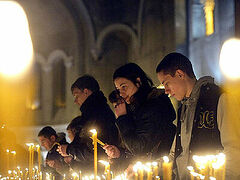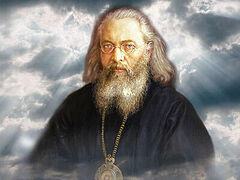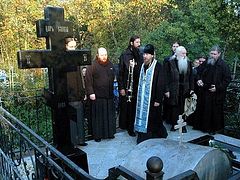In the name of the Father, the Son, and the Holy Spirit!
Today we are celebrating a special service. The Church established this day not just as a day to commemorate those whom we know who have died, but all Orthodox Christians who have died throughout the ages. The boundary between the world of the living and the world of the dead is delineated to some extent in the Gospels. What do we know about this boundary?
Do you recall the parable of the rich man and Lazarus? What does the rich man say to Abraham, whom he saw after death? In torments, he asks Abraham not only to give him some respite, but also for his family: “Father Abraham, send Lazarus to my father’s house, for I have five brothers” (cf. Lk. 16:27). He asks Abraham to warn them about the terrible lot that has fallen to him, so that they would not end up in this place of torment. Abraham replies that they have Moses and the prophets, but, If they hear not Moses and the prophets, neither will they be persuaded, though one rose from the dead (Lk. 16:31). Moreover, we can see from this Gospel story that there is also a boundary between the world of the righteous and the world of sinners, who have crossed the threshold of eternity. “And the boundary is great between us and you,” Abraham says to the sinful rich man. There is a great abyss.
So, what is our connection with the reposed? And what can we say about it? First of all as we know, this connection comes through prayer. We ask the Risen Savior to give rest to our family and friends. We all belong to the same army of Orthodox Christians, we are all citizens of the same country, and this country is the heaven of the Church. And the earthly Church and the Heavenly Church, also called the Church Triumphant, are the one Body of Christ. The Savior by His resurrection united us in our Heavenly Fatherland—but how do we live? It is worth thinking about this.
Probably how we communicate with our loved ones depends on how well we heed the Old Testament revelation that was given to the people in the parable the Savior told; it depends on how well we hear the words of the Gospel sermon. And probably our communication and ability to help them with prayer and good works depends not only on how well we hear these Gospel commandments, but also on how well we fulfill them. But if we do not fulfill them, then even if we should we see great miracles, or even should the dead appear to us, we still won’t have any special faith; if we live like pagans, and waste the feeling for which there is no substitute—the feeling of eternity.
Some try to give people a surrogate of this feeling, a pseudo-eternity. This in part happens through a descent into the state of an animal—when a person has no need of anything higher. He eats, drinks, and thinks that everything is going normally, as it does with everyone else.
But sometimes—and this is characteristic of our times—this is connected with a pseudo-world. A person gets lost in the internet and forgets not only that there can be eternity—he forgets what exists around him. Sometimes young people come—and not only young people—with total emptiness in their eyes. You ask, “Listen, my dear, what’s happened to you?” and he or she replies, “I’ve fallen into a terrible network.” “What network? A criminal network?” “No, I’ve fallen into the invisible network of the internet web. I can’t live without it. I live in another world.” But this evil did not come about by itself; it appeared first in Western civilization, which is doing everything to draw people away from the remembrance of death or even force them to forget it altogether.
The thought of death is a kind of timebomb, a minefield for the modern liberal ideology that is being inculcated from all fronts into the minds and hearts of people living on earth.
Why does someone act according to man’s ancient enemy’s suggestions that people should forget about death? Because in the consciousness of every person, there are no means possible for the cultivation of people’s minds, nor of man’s environment, that can force him to forget the pressing problem that continually knocks at his heart: “Why have I been given this life, which will only be cut short? Why didn’t I give this life to myself? It is completely dependent upon me.” This question, as we recall, was posed by the hero of Dostoevsky’s novel, The Idiot. And no ideology, no technological control of mass consciousness can answer this question. Only religion can answer this question. Why? Because ideology is aimed at the masses, at social classes, at the electorate; but religion aims at the heart not of the masses, nor of social classes, but of each human being individually—which it sees as a great treasure of priceless value to the Lord God…
We are surrounded by saints. But do we always turn to them? Do we always ask our saints for help, and ask that by their prayers they would intercede for us before the Throne of God, to ease the lot of our friends and family?
The last enemy that shall be destroyed is death (1 Cor. 15:26), says the Apostle in his epistle. And in the Old Testament, the wisest of men, King Solomon, says in the Book of the Wisdom of Solomon, For God made not death, neither hath he pleasure in the destruction of the living. For he created all things that they might be: and he made the nations of the earth for health (Wis. 1:13–14).
How did death come into the world? Why have we been condemned to so many tribulations? We know from the words of Apostle Paul in his epistle to the Romans: “And through sin did death come into the world.” Besides the many things that grieve us, our world is also God’s unceasing revelation in the heart of every person. This is the heart.
But what about the body? Christianity speaks of the resurrection of the body, but a spiritual body. And probably that body, which will be resurrected, will take with it all that was connected with the physical body. Without the body we cannot communicate with others, we can’t do good deeds, or perform spiritual labors. As it is in the nature of Christ the Savior Himself, the physical body is also tied to the divine in man. The world can become a body, and this is frightening—when the world turns into muscles, tendons, and bones. God calls us to not only rise in the spiritual body after death, but also to become in our lives co-laborers with God in partaking of existence, spiritual participation, resurrection, and life in all its fulness. To this we are called, so that the Savior’s promise, which He left to us in His Gospel—“I gave you life, and I gave it in abundance” (cf. Jn. 10:10)—might come true. By the prayers of the saints who surround us, the Most Holy Mother of God, the angelic world, and by God’s mercy, may this come to pass in the life of each one of us and in the lives of our reposed family and friends—to whom through the prayers of the Church may God grant to inherit life eternal, and to rise in the glorious resurrection, in the spiritual body. Amen.





